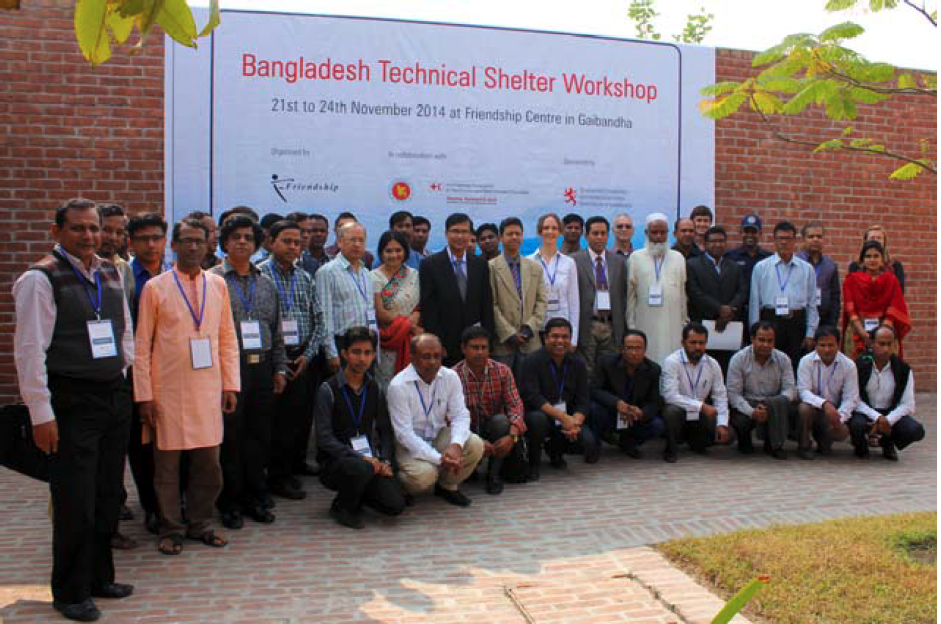Technical Shelter Workshop 2014, Bangladesh – IFRC Shelter Research Unit

Institutional Context of the Workshop
IFRC Shelter Research Unit (SRU) conducted research on technical aspects of implemented shelter solutions in Bangladesh, between 2011 and 2013, based on prior research done in Bangladesh by IFRC after Cyclone Sidr and in the frame of the ‘Shelter Solutions’ approach developed within the
IFRC SRU with as one of the first cases in Bangladesh. For some time, the IFRC SRU was looking for an opportunity to share the results of the research in-country, with the principal shelter actors. The workshop would be a step towards rendering the conclusions of the research work operational; towards local capacity building and subsequent improvement of shelter responses in Bangladesh.
Such opportunity was finally found with Friendship Luxembourg and Friendship Bangladesh, who formed a partnership with the Luxembourg Red Cross and the IFRC Shelter Research Unit to organize this workshop. The Luxemburg Ministry of Foreign Affairs offered to fund, which was topped up with co-funding from Luxemburg Red Cross and Friendship.
The in-country knowledge, team, and network of Friendship Bangladesh was mobilized to expand IFRC SRU’s research to other regions in Bangladesh, organize and host the workshop, invite regional, national and international shelter actors in the country, and liaise with the Government.
Objectives of the Workshop
Principle Objective:
Together with the prime shelter actors in the country, and with the support of the Government, expand and consolidate technical shelter knowledge in Bangladesh –towards national shelter strategies
Specific Objectives:
- Collect, share, and discuss technical best practices and lessons learned by Government, local, regional, national and international NGOs, UN Agencies, and RCRC Movement members.
- Develop, collectively, technical key messages on key-topics such as emergency shelter, recovery sheltering, site organization, structures, cladding, training, and capacity building.
- Conclude, collectively, on the current state of technical sheltering knowledge in Bangladesh, gaps that need to be addressed, and the way forward in terms of developing national shelter strategies.
Outcomes of the workshop
The workshop was a success. Not only were all types of shelter actors well-represented in the workshop, they also shaped the discussions and knowledge creation in the workshop together with the organizers. This means that the outcomes now in hand are of exceptional value: a preliminary consensus was built around a range of issues crucial to sheltering, ranging from limitations on emergency sheltering response modes, over acceptable foundations and structures to capacity building needs on decision making, shelter management, regional and community levels.
It was thus decided to conclude the workshop with a recommendation to the Government informed by the consensuses reached during the workshop. The recommendation is two-fold:
- technical recommendations: preferred policies for different aspects of shelter
- follow-up recommendations: how to continue and consolidate the efforts of the workshop into national shelter strategies
Besides that, the body of knowledge unlocked in the workshop is briefly captured in this report and will be shared broadly among shelter actors in Bangladesh.
You can download the full extended workshop report below.
